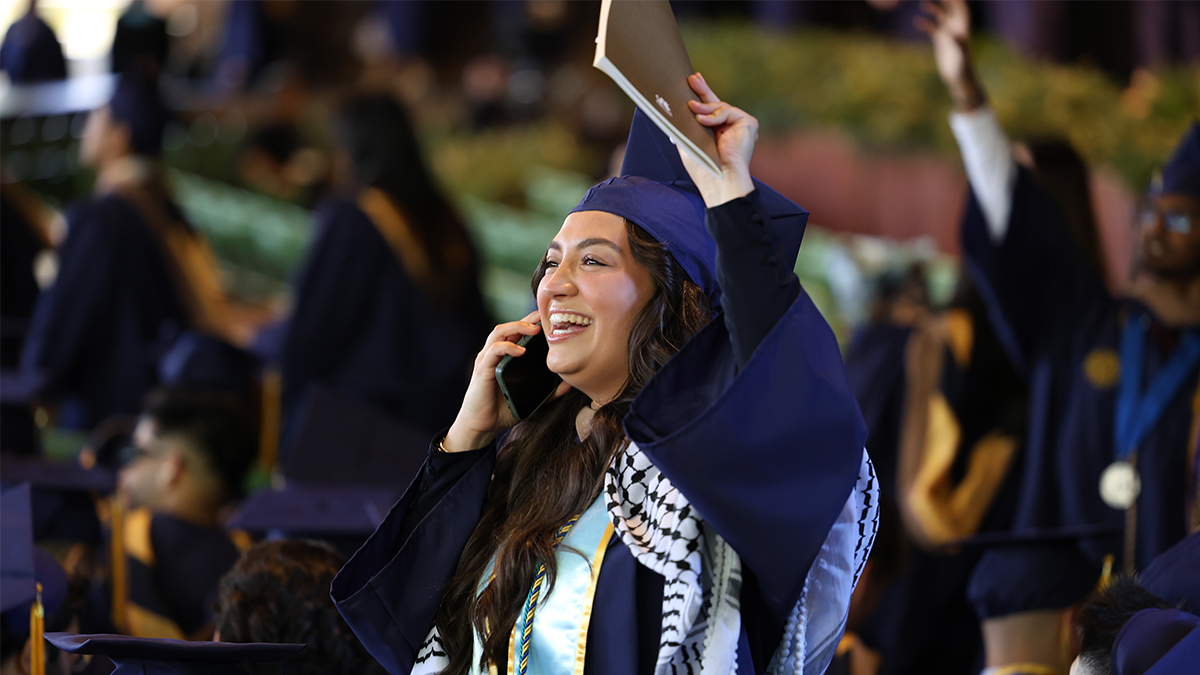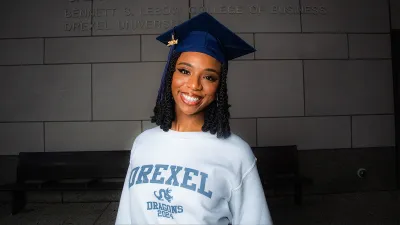
Co-op Award Caps a Stellar Student Career for Aisa Feratovic '24
Leading up to commencement, milestones go by quickly for graduating students. In the final month of her college career, Aisa Feratovic ’24 attained one that reflected another from earlier in her college career.
Feratovic, a marketing major from Long Branch, New Jersey, was the first Drexel co-op student hired by Harding Loevner, an investment firm based in Bridgewater, New Jersey, and she received a Cooperative Education Award from Drexel’s Steinbright Center for Career Development for her work across two co-op placements there in 2022-23 and 2023-24. She’ll now be the first Drexel alumna to go from co-op to full-time there when she joins the company as a client management associate later this year.
Before commencement, Feratovic shared with us her experiences as a co-op student, the support she received from a number of mentors and how the skills she learned on the job helped her in the classroom.
Drexel LeBow: Tell us about your time working at Harding Loevner.
AF: I’ve had such a great experience between my two co-ops and working part-time during classes. I’ve been working at HL for about a year and six months, and I’ll be coming back in the fall.
My advisor, Sarah Grogan, made it possible for me to do the four-year, two co-op program. When accepting this co-op in the investment industry, there was definitely a learning curve as I was joining from an arts background. As I learned all the acronyms used at the firm and what investment vehicles they correspond to, I became more passionate about the industry and the firm.
DL: Could you describe the roles you’ve worked in there?
AF: I was on the production team, contributing to the production and review of our marketing collateral including presentations and reports on an ad hoc, monthly, and quarterly basis for investment strategies used at meetings with clients or prospects.
I had to apply numeracy skills to update and manage data used in published materials and execute strategy update communications to internal and external constituents. I also created social media strategies, including a quarterly social media analytics report, a social media distribution calendar, and drafted posts for the corporate LinkedIn account to keep them active and drive engagement.
My second co-op was more technically driven. I told my manager that I was more interested in finance and data, and I ended up working on client relations projects in Salesforce, website development and data automation using software like PowerBI or Seismic. It was definitely more into the nitty-gritty.
DL: What kind of support did you receive on the job?
AF: My team would include me in any project if I was interested, which I thought was great. I had a weekly touch-base with my manager, and after each assignment, she’d ask, “How did you like that project? Do you want to do more of that or more of something else?” They made it really customizable for me based on what I was interested in.
There are three Drexel alumni at the firm, and I’ll be the fourth when I start in the fall. Ryan Stone was my first manager, and he’s one of the alumni. I was the first ever co-op they’ve ever had. Ryan had been pushing for a co-op program for a long time, and after he demonstrated how successful it could be and how it would be a good investment, the firm successfully created a curriculum. Really, we both decided to take a big leap. There wasn’t anything in Drexel’s archives about them; when I chose the co-op, it was just based on what I’d seen about them online.
Now that it was successful the first time and they found a new employee through co-op, they’re trying to integrate the program into some other teams in the future.
DL: Tell us about the working environment during your co-ops.
AF: It’s a smaller firm and very tight-knit; I’ll be walking down the hallway at work, and the CEO will be around and you’re able to have a conversation with him. There’s a mentorship program at HL, where I met once a month with a member from the trading desk who also went to Drexel. There’s also a “Coffee Roulette” program where you get paired randomly with anyone from across the company every two weeks. I met with several analysts, portfolio managers, and even the CFO! Learning from them through our conversations and how they communicated through emails and teams chats was great. These relationships were crucial in helping me develop new skills in leadership, time management, and many other areas of investment.
DL: Tell us about bringing skills back from co-op into your classes at LeBow.
AF: Because I ended up taking finance after the co-op, it was so interesting to see connections being made in the classroom based on what I learned through my hands-on experience. I understood terms and definitions so much more quickly than I would have otherwise, and I was able to apply that real-world experience to exams or assignments. For example, calculating annuities in my finance class: that’s something the analysts at our firm assess when evaluating investments, so it was great being able to understand a part of their world.
DL: What will you do in your full-time role, and how did your time at Drexel help prepare you?
AF: I will be working on the client management side, which is slightly different as I will be helping with client onboarding. I prepared for this new role by working on a Salesforce project relating to adherence to client guidelines, and I was able to join a couple of client meetings during my time. As someone more extroverted, I thought I would like being in a client-facing role and getting more of that hands-on communication.
Looking back, I couldn’t be more grateful to have the opportunity to come out of college with the experience I have. It really hits you as you start to approach graduation: people are talking about how things are going to be so different and they say, “just wait until you get to the real world.” But as Drexel students, we’ve already been there! Plus at LeBow, my professors have trained me so well to communicate and present effectively, and I can bring that to client meetings. I’m thankful for that, and for so many of the resources we have here.



